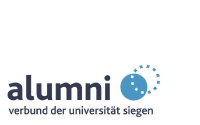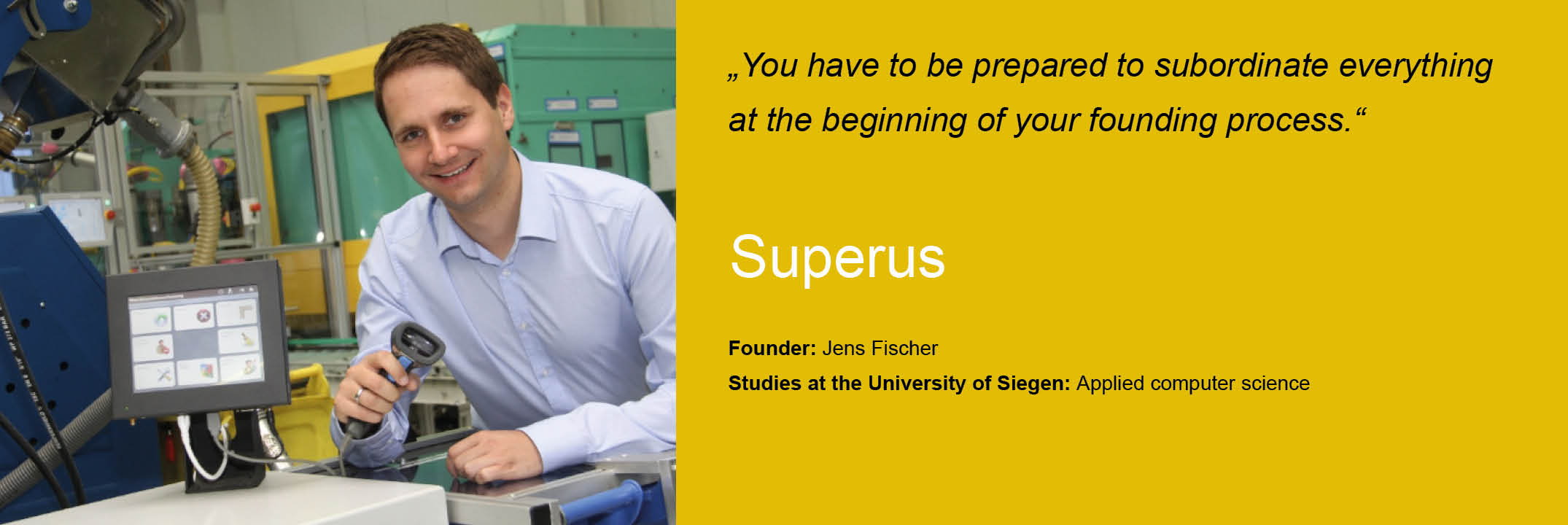Superus
Founded in December 2011, Superus specialises in process analysis and process optimisation for industry. The company is based in Birkenbrinkhausen (village near Frankenberg), the home town of founder Jens Fischer.
Jens Fischer is a graduate engineer in applied computer science. The subject at the University of Siegen appealed to him precisely because of the increased practical relevance in contrast to general computer science.
Jens Fischer uses his start-up's technology to help industrial manufacturing companies achieve greater transparency, efficiency and productivity. "Ultimately, we have developed a computer system that is a mixture of software and hardware." The technology is installed in the control cabinets of machines and serves as a kind of data blocker that records all production data. At what speed is the machine running? What are the temperatures inside the machine? What sensor data does it provide? This information, which is stored in a central database, can be analysed to provide a clear picture of the condition of the machines and the company.
As Managing Director, says Jens Fischer, he only works as a programmer 20% of the time. His main tasks today consist of administrative activities, managing his 10 employees and customer retention/customer care.
Jens Fischer received an EXIST start-up grant for his start-up. He was also named Founder of the Year 2012, which earned him a grant from Unternehmerverlag Südwestfalen. The founder can rightly claim with pride that he did not take out a single bank loan for his start-up.
How did you come up with the idea of Superus and the associated idea of process analysis/optimisation?
The idea came to me at the beginning of my studies. At the company where my father worked, a project was being carried out at the time that involved carrying out loss time analyses. To this end, the machine operators were given sheets on which they were to document any problems that occurred with the machines. When was there a problem? What was the problem? When and how could it be resolved, etc.? These records were then handed in to the respective shift supervisor and an attempt was made to analyse them using an Excel file. Unfortunately, this did not work so well, as the detail and quality of the records differed from employee to employee and transferring the data took a long time. The loss time analysis was therefore not very meaningful. My father wondered whether this analysis could be done better, perhaps more automatically. So I started working on this topic in the very first semester of my degree programme. In the third/fourth semester, I even had a first prototype ready, which I was allowed to test in my father's company thanks to the very innovation-minded managing director.
What attracted you to setting up your own company?
For me, the appeal of a start-up has always been its independence. I am my own boss and am not accountable to anyone. I can do everything the way I want to.
When did you decide to set up your own company?
After my thesis, I was torn between the decision to stay at university or become
self-employed.
On the one hand, I had completed my degree very successfully (1.0) and therefore received good offers for a
doctoral position at the university. On the other hand, by the end of my studies I had come so far that I had built
a functioning device from the prototype, which was even bought from me for 30 systems.
The crucial point, however, was that I would probably have always held it against myself if I hadn't tried self-employment at least once. I also thought that even if I failed, I would still be able to find work somewhere else.
What is/was innovative about your company?
The technical aspect, also in terms of Industry 4.0, is very innovative. But there are also other, much larger companies that are working with this technology. Our unique selling point is that we focus specifically on SMEs and smaller companies, as this is also an interesting target group. In this context, there are still many older machines, some of which have been in family ownership since the 1960s. We have made it our mission to be able to offer modern technology for older machines as well.
What was the biggest challenge you faced at Superus?
Of course, there are always challenges, but to be honest, I didn't realise them so consciously. I knew from the outset that it would be a rocky road with highs and lows. Last year, for example, was a difficult year for us because of the emissions scandal. Of course, this hit the automotive industry hard and as 80% of our customers are suppliers to the automotive industry, we were also affected. This year, for example, the corona crisis is causing difficult times for all of us.
But I see these challenges as opportunities for our further development. If we survive them, it will be an indication that the company is stable and that we have positioned it well.
To what extent did the university's Gründerbüro support you?
In hindsight, I have to say that without Frank Ermert, the head of the Gründerbüro at the University of Siegen, the start-up would probably not have worked. I'm still in contact with him today and I'm very grateful for his support in the start-up office. He made me scrutinise every detail and think about many important aspects. I could always turn to him with any problem or question.
What is your advice for young founders?
In any case, perseverance, because that is important. There are always times when you question your work and are no longer sure whether you're doing everything right. In these situations, you simply have to stay on the ball and be prepared to subordinate everything at the beginning of your start-up.
Would you found a company again?
Yes, I would found a company again at any time. But always with the aim of dedicating myself 100% to one thing. I wouldn't start a second company on the side. I want to decide in favour of one thing and then see it through properly. My company should be built on a stable foundation and establish itself on the market in the long term.
This portrait is based on an interview with Jens Fischer in Juli 2020 and was written by Janice Gust.
Click here for the start-up's homepage.


